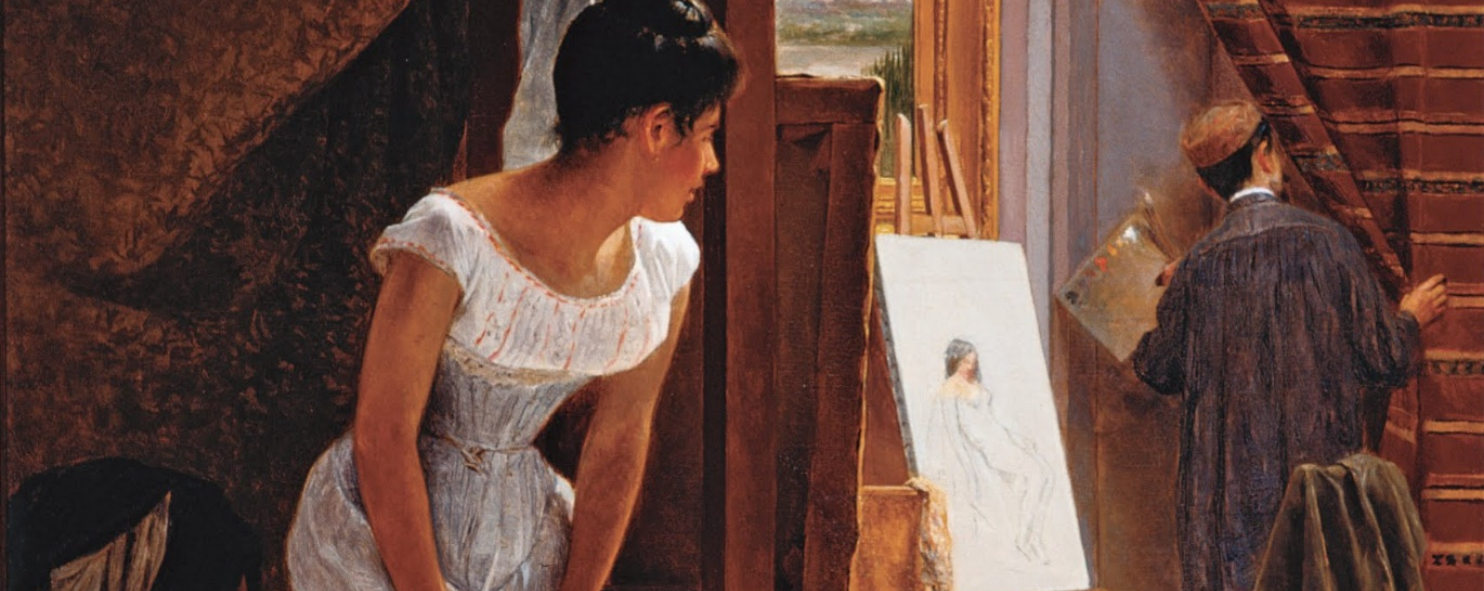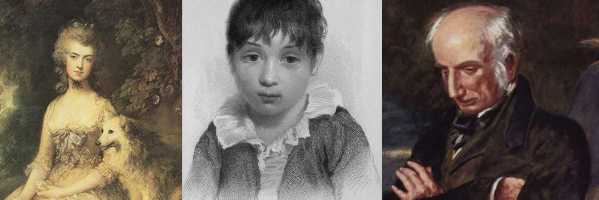Surveillance Fiction

In 2013, someone operating under the name Surveillance Camera Man posted a video filmed on a college campus. The man filming enters a library room, in which two people are sitting at a computer. Immediately they look over and one starts asking questions, though lulls in the exchange are edited to make the questioning more rapid.
Person A: What are you doing?
Surveillance Camera Man: I'm just taking a video.
A: Why are you taking video without asking us?
SCM: What?
A: Shouldn't you ask us first before you take video?
SCM: Oh, you seem confused.
A: Yeah, you're not— We have this room, and you just, like, barge in.
SCM: Oh.
A: Can you leave? ... Dude, what's your problem? Can you just leave?
SCM: Huh?
A: Can you ask us why you're taking the video?
SCM: I'm just taking a video.
A: Okay, well, I don't want to be taken a video of.
SCM: Why are you so worried about it?
A: I'm not worried. You're just being annoying.
In other clips, he enters into ongoing classes and films from the doorway, films people who are speaking on phones, films people eating in their cars, and so on. The people in the videos get very mad. In one segment, he films an arrest and gets his camera smacked by a security officer. One woman tells him, "Sir, this is America, and I have a choice that you do not take a picture of me." The videos were taken down from YouTube the following year.
In 2009, I took a course in creative writing. As an assignment, I was asked to listen in on a conversation between strangers and take notes. This activity would serve as a reference for how people outside of my usual social sphere actually talk.
In 2017, a short story was published in The New Yorker by Kristen Roupenian, who was working on a Master of Fine Arts in writing. In her story, "Cat Person," a young movie theater employee meets an older man who is buying concessions. She flirts with him, he asks for her number, and the two grow increasingly fond of each other via text, discovering the other person's life and personality in glimpses. When they finally go on an actual date, it goes poorly. Published at the height of #MeToo, the story was written about extensively in the social movement's terms. If you want to hear more in-depth about the story itself, I recommend listening to a recent discussion on the podcast After the Orgy, which pushes back against a number of misreadings from people who do not tend to think or talk about literature.
The story recently got renewed attention as another woman, Alexis Nowicki, detailed how the story was definitely lifted directly from her life. Nowicki did not know Roupenian, and was never told this real-life story would be published; Roupenian knew the real-life version of the guy from the story. This incited an ethical debate, with many arguing: this is what art is, artists steal. As I describe above, the practice is taught explicitly in creative writing programs. With the proliferation of media and networks of information, it is easier than ever to see how a stranger lives and talks, to fill in specific details about home decor, to capture the precise dynamics of a person's two cats.
As Surveillance Camera Man demonstrates, people will happily walk around and shop in a store full of surveillance cameras, but when a stranger films you exiting on his own camera, they immediately become suspicious and hostile. "Why are you so worried about it?" he asks. He's just taking a video. In the case of art, the actual presence of the individual is obscured somewhat. Rather than direct video in which a person is visibly identifiable, that person becomes a character filling a role within a narrative. In the case of Nowicki, the level of fictionalization was too low to obscure her to those who know her. So many details matched her life so precisely that she got messages from people asking if she wrote the story or knew who did. In her account, Nowicki is ultimately fine with the story being taken from her life, seemingly content to have formed the basis for what she repeatedly calls "the first work of short fiction to ever go viral" or "the most viral short story of all time" – bold claims to tackle another time, perhaps.
While Nowicki calls attention to the story's movement through new forms of online virality, the story's origin is even more dependent on the sort of social networks that allow the type of distribution and discussion that surrounded the publication of "Cat Person." Roupenian did not stand around observing Nowicki. Neither Nowicki nor her date would have seen a person standing in front of them filming as they exit the movie theater. The guy knew Roupenian, but much of the information came from trawling social networks – having the sort of access that being virtual "friends" provides. In this way, the controversy around "Cat Person" reflects a wider dynamic between contemporary literature and social media: the prominence of confessional writing.
the thing that makes twitter great is that it makes it very easy to become a fan of someone's entire life
— sadalsuud (@sadalsvvd) August 11, 2021
In the documentary We Live in Public, Josh Harris – an early Internet entrepreneur who also did a series of artistic experiments in heavy surveillance he saw as the future – offers a correction of the television-era idea that everyone would want their 15 minutes of fame. He believes that in the Internet-era, everyone would want their 15 minutes of fame per day. Sure enough, many people do seek substantial attention and socialization through online media each day, though not quite everyone and typically with an implicit set of expectations and limitations. Social media platforms are filled – often willingly, sometimes not – with troves of personal data. That this information does not add up to a true picture of the individual hardly matters; it offers enough to form a workable behavioral profile, and "Cat Person" shows how it offers enough for a skilled writer to fill in the right gaps and make a compelling story out of those fragments. In 2008, Anton Ferret applied this process to all readers rather than choosing any one subject and crafting a narrative around just one set of details.
Ferret's project, The Fugue Book, relied on a now-defunct system of connecting to Facebook, but while operational, it collected "the personal data of the people who used it (hobbies , friends, personal information of all kinds, etc.) with very few legal and technological restrictions" as well as "their friends list–people who became secondary characters." This is a violation of privacy and intended, in part, to critique the social dynamics of Facebook. Ferret describes one of the core issues as "the futility of the self at a time when personal information was at the mercy of everyone on the platforms" – and so not just in critique of the company for failing in some duty, but looking at the way one's digital "self" becomes a publicly accessible and usable batch of data. Ferret's work here is not just bitterly rejecting the way things are, though, but attempting to make something of this situation. He writes, "This opened the door for me to the core idea of the literary work: to turn the reader into a character and also, in some way, into an author." The Fugue Book is always urgently, perhaps alarmingly, about you as you read it, receiving a series of emails about you and people you know – cited accurately by name, along with details of your actual interests.
The experience of The Fugue Book, however, is only as personally engaging as your Facebook data is suitable to creating the type of story you want – creating a potential feedback loop of further outpouring of confessional data to serve newly discovered narrative needs. The confessions fueling social media were always shaped not just by the site's prompts (Facebook, early on, asked you to complete statuses in the form of "Firstname is..."), but by the long-standing confessional culture pervasive through older forms of media. Not every Facebook user will have actively read the Confessional poets, but the resulting postconfessional style became so pervasive that it became people's default mode for writing poetry if prompted. This impulse lingers also then in other forms of popular writing, such as Facebook statuses or Tweets. As Default Friend describes the confessional culture around the highly online "alt lit" world in the late 2000s and early 2010s,
Eventually this attitude became cool, and people were embracing not only being a hot mess, but sharing it compulsively. You weren’t just sharing it compulsively though, you were in some sense gambling. Maybe this would make you a serious writer, artist, or personality, too.
But in a broader picture, if your writing fails to make you a writer, it may still enable a writer to make you a popular fictional character.
Did people react so strongly to the update on "Cat Person" because they fear suffering the same fat as Nowicki, or because, on some level, they wish it were their story – their carefully curated digital self – that was shaped into a piece of fiction fit for The New Yorker? Nowicki herself seems conflicted on this, but clearly finds it flattering that she (via Roupenian's writing) went way more viral than the average short story.
Millions of people read the lives of others every day. In the popularity of "autofiction" as well – a style of heavily autobiographical fiction – the lives of those surrounding the author are also taken in as parts of the novel. With "Cat Person," the author is a non-character, reading the underlying tale on social media and then repackaging it for us to read. Meanwhile, novels like Several People Are Typing, which is told entirely through Slack messages, show that at least some readers are perfectly willing to extend their day-to-day digital reading practices into "fiction" as well. A 2015 Twitter thread was popular enough to have been made into the recent film Zola (filled with notification sounds so viewers never forget its origins). With all that in mind, "Cat Person" will likely not be the last story spun out of a stranger's social media content, and the stories need not always have such creative alterations in content and form.
Not everyone will be as content as Nowicki ultimately seems with living a constantly-digitized life that serves as material for fiction, poetry, TV, film, and so on. Some will take the role of Surveillance Camera Man's first interlocutor: "I'm not worried. You're just being annoying." Eventually, though, there will be nothing to say beyond what Surveillance Camera Man has already said – "Oh, you seem confused" – or perhaps we might turn to these words:
You live out in perpetuity what you have chosen. (Dante)
— Theodor Holm Nelson (@TheTedNelson) April 20, 2019
Header image: O Importuno — José Ferraz de Almeida Júnior
This post was originally sent as my monthly newsletter. If you would like to receive more posts like this bringing together literature old, new, and electronic each month, subscribe below for free:





